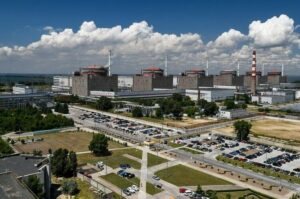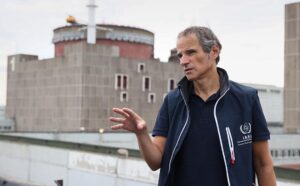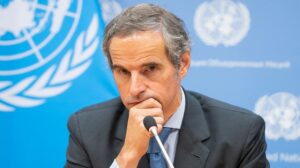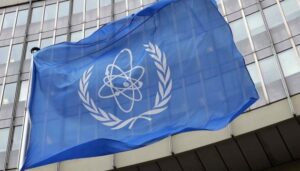
IAEA experts are closely monitoring the situation at the Zaporizhzhia nuclear power plant (ZNPP) in connection with allegations of a sabotage threat, but during recent inspections no signs of mines were found there, Rafael Grossi, the agency’s director general, said Wednesday.
“I was in contact with experts from the permanent mission to the ZNPP today, just a few hours ago. We are aware of the allegations and statements from both sides. (…) We have not detected any signs of mines during recent inspections, but we remain extremely wary,” Grossi said at a briefing in Japan, commenting on reports of a sabotage threat at the ZNPP.
He added that “we cannot relax now,” and promised to report regularly on the situation at the plant.
According to Grossi, the IAEA has requested access to a number of other locations at the ZNPP. “IAEA experts have asked for additional access. This is needed to make sure there are no mines or explosives at the site,” the IAEA quoted the director general as saying.
“In particular, access is required to the roof over reactors 3 and 4, to the engine room and to some components of the nuclear power plant cooling system,” he added.

Ukrainian President Vladimir Zelensky and International Atomic Energy Agency (IAEA) Director General Rafael Grossi at a meeting in Kiev discussed specific steps to avoid safety risks at the Zaporizhzhia NPP, the president’s press service said.
“Ukrainian President Vladimir Zelensky held a meeting with International Atomic Energy Agency (IAEA) Director General Rafael Grossi, who is visiting our state in fulfillment of the agreements reached during a telephone conversation between the head of state and the head of the IAEA on June 6,” the Ukrainian presidential press service said in a statement Tuesday.
Reportedly, the head of state stressed that as a result of Russia’s purposeful undermining of the Kakhovska HPP dam, which is the largest ecocide crime of modern times, the risks to the safety of the Zaporizhzhia nuclear power plant have significantly increased. Therefore, a quick and decisive reaction of the international community to this audacious terrorist act is urgently needed.
Zelenski positively assessed the presence of the agency’s inspectors at the Zaporizhzhia NPP illegally occupied by Russia and welcomed Raphael Grossi’s intention to personally visit the plant to assess the situation on site.
The head of state once again stressed that the only way to prevent a nuclear incident at the Zaporizhzhia NPP is its complete demilitarization, de-occupation and restoration of control over the plant by Ukraine.
According to the president’s press service, during the meeting the sides discussed specific steps that need to be taken to minimize risks and prevent incidents at the Zaporizhzhya NPP, as well as ways of cooperation with the IAEA to this end.
Zelenskiy supported Rafael Grossi’s proposal to send a group of IAEA experts to Ukraine to assess the consequences of the explosion at the Kakhovska HPP and to prepare proposals on specific directions of assistance in overcoming them. He noted that this mission would be fully assisted by the Ukrainian institutions involved.

Rafael Grossi, director general of the International Atomic Energy Agency (IAEA), said that he had left for Ukraine to meet with President Volodymyr Zelensky.
“On his way to Ukraine to meet with President Zelensky and to present a program to help clean up the disastrous Kakhovka reservoir spill,” he wrote on his Twitter account Monday.
According to the report, Grossi intends to assess the situation at the Zaporizhzhia NPP and conduct a rotation of the IAEA mission with a reinforced composition.
As reported, after the Russians blew up the dam of the Kakhovska hydroelectric power plant and spilled the Kakhovska reservoir, Grossi announced the launch of a program of assistance to Ukraine. He noted that by using nuclear techniques, the IAEA will determine the impact of the flooding on drinking water, human health, soil and water management, as well as assess the integrity of critical infrastructure.

International Atomic Energy Agency (IAEA) Director General Rafael Grossi is planning a third visit to the Russian-occupied Zaporizhzhia NPP in the near future after the full-scale invasion.
“With the establishment of the five principles and my intention to report any violations, it is important that I go to the plant again to assess developments since my last visit in late March,” said Grossi, quoted in a statement on the IAEA website Friday evening.
He expressed concern about several developments at ZNPP. First of all, this is the absence of reserve power lines to supply the plant for its own needs, although there were four of them before the war.
At the same time, the head of the IAEA noted that ZNPP had been relying on the only functioning 750 kV power line for three months already, after its failure, as it happened last time on May 22, the largest nuclear power plant in Europe was forced to switch to emergency diesel generators.
He added that Ukraine cannot repair the 330 kV transmission line located in its controlled territory that was damaged on March 1 because of military operations, and the Russian Federation also has not repaired the open 330 kV switchyard at the Russian-controlled Zaporizhzhya TPP adjacent to ZNPP in order to restore the other three 330 kV lines.
“The IAEA team of experts who are at ZNPP have not yet been granted access to ZNPP to assess the situation, despite Rosatom’s assurance that they would be able to go there. Consultations are continuing to ensure access. Our experts need to see with their own eyes what the current situation looks like and whether it is possible to restore the backup power supply there,” stressed Grossi.
According to Grossi, the tense situation at the ZNPP is underscored in particular by the mine explosions near its site, which were reported by the IAEA team last week, as well as the May 17 disruption of automatic data transmission from eight radiation monitoring stations located near the plant.
He explained that Ukraine provides data to the IAEA’s International Radiation Monitoring Information System (IRMIS), which collects near real-time radiation monitoring data from more than 6,000 stations worldwide. In the absence of automatic communication, daily radiation monitoring data from eight stations are provided to the IAEA team at ZNPP and subsequently made public on IRMIS.
According to Grossi, he told the Ukrainian authorities that the IAEA was dealing with the issue with the plant management and the relevant officials.
He also noted that the planned rotation of the current IAEA expert team – the eighth since the mission was established last September – had been postponed due to local weather conditions. At the same time, new teams of IAEA experts arrived at all Ukrainian-controlled nuclear power plants, including the Chernobyl plant.
In general, describing the situation at Ukrainian nuclear power plants, the Head of the IAEA pointed out that the reactor of the Pivdenno-Ukrainian Nuclear Power Plant, which was stopped on May 22, had returned to its full capacity. In addition, he noted that the transportation of spent nuclear fuel to the centralized storage facility in the Chernobyl zone had been resumed. At the same time, he noted that on May 29, an unmanned aerial vehicle was detected near the Khmelnytskyi nuclear power plant.
Grosi also confirmed that within the framework of the comprehensive medical assistance program implemented by the agency, including psychological support, the IAEA experts would deliver necessary medical equipment to several nuclear power plants.
In addition, he said, the IAEA has arranged two more deliveries of equipment for nuclear power plants in recent days, this time of satellite communication systems, antennas and spectrometers, made possible by contributions from Britain and the United States.
“With 18 deliveries since the beginning of military operations, the IAEA has facilitated a package of international assistance to Ukraine totaling EUR5 million in support of nuclear safety,” Grossi concluded.
As reported, at the end of May the head of the IAEA proposed 5 safety principles for the Zaporizhzhia NPP
First, the ZNPP should not be used as a storage facility or a base for storing heavy weapons (i.e., MLRS, artillery systems and ammunition, tanks) or military personnel that could be used for an attack from the plant.
Second, there should be no attacks from or against the plant, in particular on reactors, spent fuel storage facilities, other critical infrastructure or personnel.
The third principle is to eliminate the risk of loss of external power supply, for which it must be made available and safe.
Fourth – all structures, systems, and elements necessary for safe and reliable operation of ZNPP must be protected against encroachments or acts of sabotage.
As a fifth principle, he pointed out that no actions should be taken that undermine the above principles.
He said he formed this set as a result of intensive consultations with Ukrainian leadership as well as Russia.
On June 2, the Ukrainian State Nuclear Regulatory Inspectorate (SNRIU) reported that Russian hijackers had blocked the transmission of information from the Automated Radiation Situation Monitoring System (ARMS) of the Zaporizhzhia NPP that they occupied.

International Atomic Energy Agency (IAEA) Director General Raphael Grossi will visit the Zaporizhzhya nuclear power plant in Ukraine next week to personally assess the seriousness of the nuclear safety situation at the site and to stress the urgency of protecting it during the ongoing military conflict in the country.
“This will be the second time Director General Grossi has crossed the front lines to reach Europe’s largest nuclear power plant, and the first since he established a permanent presence of IAEA experts at the site in southern Ukraine last September 1,” the IAEA press office said in a statement.
Grossi stressed that he was determined to do everything possible to help reduce the risk of a nuclear accident.
“Despite the fact that we have been at the site for seven months now, the situation at the Zaporizhzhia NPP is still unstable. The threats to nuclear safety and security are all too clear, as is the need to act now to prevent an accident with potential radiological consequences for the health and environment of people in Ukraine and beyond. So I am continuing to work on a proposal to protect the plant,” he said.
Grossi said his trip to Ukraine is also aimed at ensuring that regular rotations of IAEA experts to and from the site are maintained and improved after the very difficult circumstances faced by the experts during the previous rotation in February, which was delayed by almost a month. He will be accompanied by a new group of IAEA experts, which will be the seventh to be present at the site since the IAEA Support and Assistance Mission to Zaporozhye was established.

Energy Minister Herman Halushchenko called on his European colleagues to support Ukraine’s candidacy for the Board of Governors of the International Atomic Energy Agency (IAEA).
The Energy Ministry reported in its Telegram channel on Monday that Galushchenko made such a proposal during an informal meeting of EU energy and transport ministers in Stockholm on February 27.
“The Energy Minister said that Ukraine is putting forward its candidacy for the IAEA Board of Governors for 2023-2025 and urged the meeting participants to join the discussion of this issue and support the Ukrainian application,” the ministry said.
The head of the Energy Ministry during the meeting thanked the EU representatives for the 10th package of sanctions against Russia and stressed the need to not only maintain the pressure on the aggressor, but also to extend it to all areas of the Russian energy sector, in particular the nuclear industry, the ministry said.
According to Galushchenko, the time has come to implement sanctions against Rosatom.
“It is time to go further and impose sanctions against Rosatom, which covers up the Russian regime’s nuclear terrorism and sponsors the Russian army. We welcome the decision by Finland, Bulgaria and the Czech Republic to refuse to cooperate with Russia in the nuclear industry and call on other partners to take this step,” the minister said.
According to the IAEA, the Board of Governors is one of the agency’s two governing bodies along with the annual general conference of the IAEA member states.
The Council reviews the IAEA’s financial statements, program and budget and makes recommendations on them to the general conference. It reviews applications for membership in the agency, approves safeguards agreements, and publishes the IAEA’s safety standards. It also appoints the Agency’s Director General, who is approved by the General Conference.